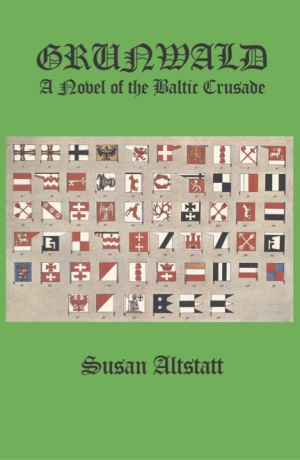Grunwald
A Novel of the Baltic Crusade
Grunwald is an epic historical novel set during a harrowing period.
Susan Altstatt’s historical novel Grunwald concerns church, state, and tribal tensions during the Baltic Crusade.
When Jadwiga is declared the ruler of Poland in the 1380s, she is banned from marrying William of Habsburg, to whom she has been betrothed since childhood. Instead, she’s ordered to marry a Litvin priest and leader, Jogaila. Jogaila is twice her age, a recent Christian convert, and also comes from a large ruling family.
Despite the marriage, the couple’s families remain at odds over power structures; both fight for their own ideals of honesty and fidelity. But as Jogaila and Jadwiga fall in love, they learn to work together. They hope to assert their rule over and against the desires of council people and their families. Meanwhile, Ulrich, the eventual grand master of the German Order, tries to get out from under his ruthless brother, Grand Master Conrad; Conrad pits people, and in particular Jadwiga and Jogaila, against each other in order to win German rule. Despite the best diplomatic efforts of Jadwiga, Jogaila, and Ulrich, a war ensues.
Though Ulrich, Jadwiga, and Jogaila narrate much of the book, there are moments in which an omniscient narrator takes over, muddling the story. Though the three central narrators are characterized in consistent terms—Jogaila in terms of his shyness, Jadwiga in terms of her impulsiveness, and Ulrich in terms of his fragile integrity—they are indistinct in conversation, adopting a tone that is uniform, laconic, and curt.
The tragic tale is encompassed at the book’s beginning and ending by the battle scene at Grunwald. In between these moments, there are gruesome instances of witchcraft, orgies, court intrigue, and politicking, resulting in a stark backdrop. Indeed, the book’s pace becomes laborious because of its secondary instances of backstabbing, murder, and kidnapping. People are introduced at a rapid rate (and some are called by multiple names); the book loses its sense of direction. Its prose is intricate and layered, further obscuring the continuity of the busy plot. The romantic scenes between Jadwiga and Jogaila help to break up this brutal progression. They do not expect their feelings, which are enlivening. A climactic dispute between the pair is made to represent Europe’s problems in microcosmic form; resolved with panache, it also suggests that love is victorious. Still, this personal victory is a mere counterpoint to the book’s reigning, somber tenor.
Set during a harrowing period, Grunwald is an epic historical novel in which stalwart figures work to counteract the treachery and duplicity of the institutions that direct their lives.
Reviewed by
Mari Carlson
Disclosure: This article is not an endorsement, but a review. The publisher of this book provided free copies of the book and paid a small fee to have their book reviewed by a professional reviewer. Foreword Reviews and Clarion Reviews make no guarantee that the publisher will receive a positive review. Foreword Magazine, Inc. is disclosing this in accordance with the Federal Trade Commission’s 16 CFR, Part 255.

